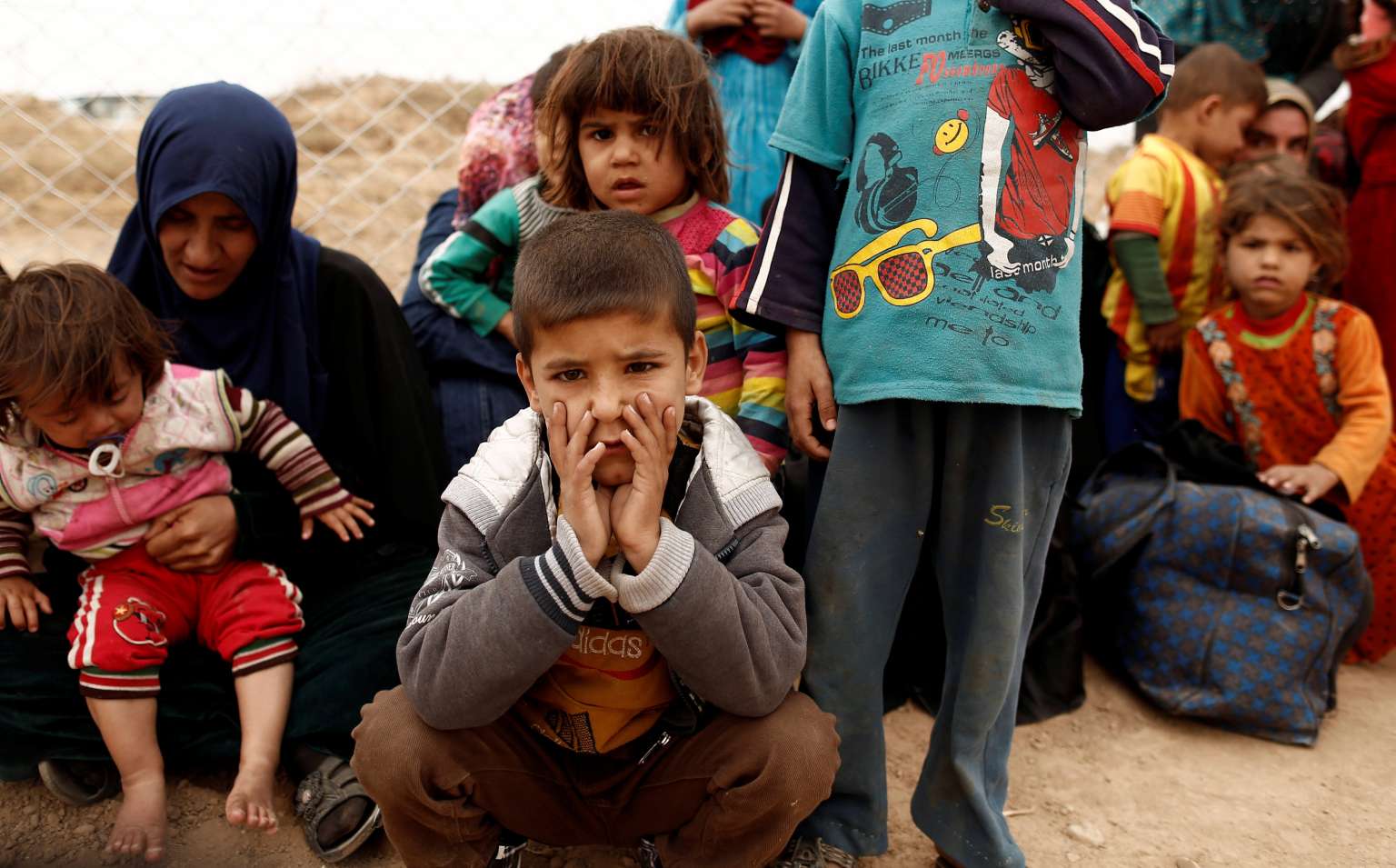ISIS massacres scores of villagers, herds tens of thousands into Mosul as human shields as Iraq offensive looms
Sign up now: Get ST's newsletters delivered to your inbox

Newly internally displaced people sit upon their arrival at Al Khazar camp near Hassan Sham, east of Mosul on Oct 28, 2016.
PHOTO: REUTERS
Follow topic:
QAYYARAH, Iraq (AFP, REUTERS) - The Islamic State in Iraq and Syria (ISIS) group has killed scores of people as it herds tens of thousands into Mosul for use as human shields against advancing Iraqi forces, the United Nations said on Friday (Oct 28).
Thousands have fled in the other direction, prompting a warning of "massive displacement" when fighting inside the Islamists' last urban stronghold begins.
The UN human rights office said ISIS had reportedly shot dead 232 people in a single day on Wednesday (Oct 26) and killed another 24 the previous day.
Spokeswoman Ravina Shamdasani said the execution-style killings came as ISIS pushed forward with a strategy of forcing people living outside Mosul into the city.
ISIS "has been forcing tens of thousands of people from their homes in some districts around Mosul," Ms Shamdasani said.
"ISIL's depraved, cowardly strategy is to attempt to use the presence of civilian hostages to render certain points, areas or military forces immune from military operations, effectively using tens of thousands of women, men and children as human shields," Ms Shamdasani said. "Many of those who refused to comply were shot on the spot,"she said.
Those executed included civilians who have refused to comply with the relocation orders and those who previously worked for the government security services, she said.
UN High Commissioner for Human Rights Zeid Ra'ad al-Hussein has voiced deep concern at reports that some individuals in the areas south of Mosul have "embarked on revenge killings and have vowed on television that there would be 'eye-for-eye' revenge against those who sided with ISIL", Ms Shamdasani said, using an alternate acronym for ISIS. "Some people say that 'I saw this man coming, and he killed my father, so I couldn't resist, I had to exact revenge,'" she said.
Some villagers have been prevented from returning to their villages due to their perceived support of ISIS, she said.
Government screening is in place to check people fleeing Mosul but the process must be carried out in humane conditions respecting international standards, Ms Shamdasani said. "Captured ISIL fighters and those perceived to have supported them must be treated fully in accordance with international law and held accountable for their crimes by properly constituted tribunals."
The killings, which the UN rights office said have been "corroborated to the extent possible", are just the latest in a long line of atrocities committed by the terrorists since they overran swathes of Iraq in 2014.
ISIS has carried out mass executions, bombed civilian targets including markets and mosques, and perpetrated a campaign of massacres, enslavement and rape targeting members of the Yazidi religious minority.
As Iraqi forces have closed in on Mosul from the north, east and south, growing numbers of civilians have fled ISIS-held areas and the impending fighting in territory the Islamists control.
The International Organisation for Migration said that as of Thursday (Oct 27), 15,804 people had been displaced since the operation began on October 17, the vast majority in the Mosul region.
"We've seen... quite a dramatic increase in the numbers in the last few days, and they are now going into the newly set up camps," Mr Karl Schembri, regional media adviser for the Norwegian Refugee Council, told Agence France-Presse.
"This is already worrying because they haven't yet entered the city... when that happens, it's going to be quite massive displacement," he said.
The potential for a humanitarian crisis as tens of thousands of civilians are forced into camps with winter looming is just one of a raft of issues that have complicated military planning for the recapture of Mosul.
Thousands of Kurdish peshmerga fighters are taking part in the operation alongside Iraqi government troops and Kurdish leaders have made clear that they will expect payback once it has been successfully completed.
The Kurds, who have expanded the territory under their control far beyond the boundaries of their long-standing autonomous region in the north, say their hopes of a new Iraq have been dashed and they will now explore a separate future.
"As soon as Mosul is liberated, we will meet with our partners in Baghdad and talk about our independence," said the region's prime minister, Mr Nechirvan Barzani.
"We are not Arabs, we are our own Kurdish nation... At some point there will be a referendum on the independence of Kurdistan, and then we will let the people decide," he told Germany's Bild newspaper.
But for now, the battle for Mosul is far from over, and most of the advancing forces are still some way from the city limits.
The head of US military operations in the Middle East, General Joseph Votel, said the Islamists were suffering heavy losses.
"Just in the operations over the last week and a half associated with Mosul, we estimate they've probably killed about 800 to 900 Islamic State (in Iraq and Syria) fighters," Gen Votel told Agence France-Presse in an interview.
Washington estimates there are between 3,500 and 5,000 ISIS fighters in Mosul and as many as 2,000 more in the wider area.
The US-led coalition has said that the terrorists can still travel in smaller groups, but cannot move in large convoys - hampering their ability to replace losses.
ISIS still controls a corridor of territory west of Mosul linking it with the Syrian part of the caliphate it declared in 2014.
But there too the Islamists have come under mounting pressure, with Western leaders raising the prospect of an offensive to capture their Syrian stronghold of Raqqa within the next few weeks.

